(Press-News.org) ATLANTA, May 1, 2024 — The American Cancer Society (ACS) today released a first-of-its-kind Cancer Facts & Figures for Asian American, Native Hawaiian, & Other Pacific Islander People, 2024-2026. This report shows that despite limited disaggregated data, there is wide variation in the cancer burden among ethnic groups that make up this fast-growing population. Cancer is the second-leading cause of death in the United States nationally but ranks first in Chinese, Filipino, Korean, and Vietnamese individuals, with lung cancer the leading cause of death in men of every Asian American, Native Hawaiian, and Other Pacific Islander (AANHPI) ethnic group. Death rates for other largely preventable cancers like liver, stomach, and cervical cancers in Native Hawaiian and other Pacific Islander people are about two - three times as high as White people.
“The reasons behind variations in the cancer burden among Asian American and Pacific Islander populations are multifactorial,” said Dr. Nikita Wagle, principal scientist, cancer surveillance research at the American Cancer Society and lead author of the study. “These populations, specifically Asian Americans, consist of many ethnic groups that are diverse in terms of immigration patterns, behavior, exposures in countries of origin, and social determinants of health. Additionally, the use of screening and other preventative services varies between these groups.”
This novel report also shows lung cancer is the leading cause of cancer death in women who are Chinese, Japanese, Vietnamese, Korean, and Native Hawaiian, whereas breast cancer ranks first in Guamanian, Samoan, Filipino, and Asian Indian women. Only 1 in 2 breast cancers in Guamanian, Samoan, Pakistani, Tongan, Laotian, and Hmong women are diagnosed at an early stage compared with 2 in 3 White women and 3 in 4 Japanese women, likely reflecting challenges in access to care.
“Although disaggregated data are still extremely limited, we hope that these startling disparities will spur local communities and health care providers to increase awareness of cancer symptoms and opportunities for cancer prevention and early detection through screening,” said Rebecca Siegel, senior scientific director, surveillance research at the American Cancer Society, and senior author of the report.
The term “Asian” refers to a person with origins in the Far East, Southeast Asia, or the Indian subcontinent. This group includes, but is not limited to, Asian Indians, Cambodians, Chinese, Filipinos, Hmong, Japanese, Koreans, Pakistanis, and Vietnamese. The term “Native Hawaiian and Other Pacific Islander” refers to people with origins in Hawaii, Guam, Samoa, Tonga, or other Pacific Islands throughout Polynesia, Micronesia, and Melanesia.
In 2021, approximately 24 million Asian American and 1.7 million Native Hawaiian and Other Pacific Islander individuals (single or mixed race) lived in the U.S., representing about 8% of the population. Aside from multiracial people, Asian Americans are the fastest-growing population in the U.S., with the size projected to double between 2016 and 2060, mostly through international migration.
For these important findings, ACS researchers analyzed data from the National Cancer Institute (NCI), the Centers for Disease Control and Prevention (CDC), and the North American Association of Central Cancer Registries (NAACCR).
Other key data in the report includes:
Breast cancer is the most commonly diagnosed cancer among women of every Asian American and NHPI ethnic group, ranging from 17% of all cancers among Hmong women to 44% among Fijian women.
The most commonly diagnosed cancer in AANHPI men is prostate cancer (as in the overall U.S. male population) with the exception of Chinese, Vietnamese, Laotian, and Chamorro/Guamanian men, among whom lung cancer ranks first, and Korean, Hmong, and Cambodian men, among whom colorectal cancer ranks first.
The 5-year relative survival rate for breast cancer ranges from 72%-74% in Tongan, Chamorro/Guamanian, and Samoan women to 94% in Japanese women (versus 93% in White women).
Colorectal cancer 5-year survival ranges from 48% in Cambodian people to 71% in Pakistani people (versus 65% in White people).
Despite Asian Americans overall having a 40% lower overall cancer death rate than the White population, liver cancer mortality is nearly 40% higher, and stomach cancer mortality is twice as high.
“It’s essential that we acknowledge the diversity of the Asian American, Native Hawaiian, and Other Pacific Islander population. Consideration of cultural appropriateness, translation into native languages, improved access to healthcare and patient navigation, could help increase knowledge and uptake of cancer screening and preventive services,” said Dr. Ahmedin Jemal, senior vice president, surveillance and health equity science at the American Cancer Society and a contributing author of the report. “Further research is also needed among the ethnic groups of this highly diverse population to better understand the cancer burden and help save lives.”
ACS’s advocacy affiliate, the American Cancer Society Cancer Action Network (ACS CAN), supports sustainable funding for patient navigation services which can improve health outcomes for diverse populations through community outreach and targeted care coordination as well as policies that promote timely collection and publication of disaggregated demographic data which can help identify disparities to improve health equity in cancer prevention, detection and treatment among various groups within a population.
“As this report shows, cancer affects everyone, but not equally,” said Lisa A. Lacasse, president of ACS CAN. “We urge lawmakers to support policies that increase access to quality, culturally appropriate cancer care by funding patient navigation services and ensuring that detailed race and ethnicity data are available, accurate, objective and impartial. Such policies are critical to making sure that everyone has a fair and just opportunity to prevent, detect, treat and survive cancer.”
# # #
About the American Cancer Society
The American Cancer Society is a leading cancer-fighting organization with a vision to end cancer as we know it, for everyone. For more than 100 years, we have been improving the lives of people with cancer and their families as the only organization combating cancer through advocacy, research, and patient support. We are committed to ensuring everyone has an opportunity to prevent, detect, treat, and survive cancer. To learn more, visit cancer.org or call our 24/7 helpline at 1-800-227-2345. Connect with us on Facebook, Twitter, and Instagram.
END
SPOKANE, Wash. – Despite ChatGPT’s reported ability to pass medical exams, new research indicates it would be unwise to rely on it for some health assessments, such as whether a patient with chest pain needs to be hospitalized.
In a study involving thousands of simulated cases of patients with chest pain, ChatGPT provided inconsistent conclusions, returning different heart risk assessment levels for the exact same patient data. The generative AI system also failed to match the traditional ...
PULLMAN, Wash. -- A new computer model uses a better artificial intelligence process to measure snow and water availability more accurately across vast distances in the West, information that could someday be used to better predict water availability for farmers and others.
Publishing in the Proceedings of the AAAI Conference on Artificial Intelligence, the interdisciplinary group of Washington State University researchers predict water availability from areas in the West where snow amounts aren’t being physically measured.
Comparing ...
A simple blood test could allow doctors to determine whether a person may be at higher risk for stroke or cognitive decline during their lifetime, according to a new UCLA Health study.
The study, published in the journal Stroke, found that measuring concentrations of a network of inflammatory molecules in the blood could allow doctors to calculate a risk score for susceptibility for cerebral small vessel disease – a common cause of stroke and a contributor to cognitive decline found especially among the elderly.
Currently, the only way to determine a person’s risk for cerebral vascular diseases has been ...
WASHINGTON, DC – May 1, 2024 – Three-quarters of Americans feel mental health conditions are identified and treated much worse than physical health issues within the U.S. healthcare system, even as more than 80% perceive a dramatic rise in prevalence of mental health issues in the last five years, according to a new survey from West Health and Gallup released at the start of Mental Health Awareness Month and Older Americans Month.
Nearly identical percentages believe mental health is handled either “much” (38%) or “somewhat” worse (37%) than physical health ailments, while 15% say they are dealt with “about the same.” ...
Research Highlights:
When adults became angry after remembering past experiences, the function of cells lining the blood vessels was negatively impaired, which may restrict blood flow. Previous research has found that this may increase the risk of heart disease and stroke.
In this study, episodes of anxiety and sadness did not trigger the same change in functioning of the blood vessel lining.
Embargoed until 4 a.m. CT/5 a.m. ET Wed., May 1, 2024
DALLAS, May 1, 2024 — A brief episode of anger triggered by remembering past experiences may negatively impact the blood vessels’ ability to relax, which is essential ...
What? 5th International Conference on Governmental Science Advice, INGSA2024, marking the 10th Anniversary of the creation of the International Network for Governmental Science Advice (INGSA) & first meeting held in the global south.
Where? Kigali Convention Center, Rwanda: https://www.ingsa2024.com/
When? 1 – 2 May, 2024.
Context: One of the largest independent gatherings of thought- and practice-leaders in governmental science advice, research funding, multi-lateral institutions, academia, science communication and diplomacy is ...
A new species of the Japanese lily known as sukashiyuri has been identified for the first time since 1914 by a research team led by Dr. Seita Watanabe, a specially appointed assistant professor at the Botanical Gardens and the Graduate School of Science at Osaka Metropolitan University.
Dr. Watanabe questioned the classification used up to now for sukashiyuri group, which usually has orange flowers. These lilies have high ornamental value, having been exported from Japan for more than two centuries. There have been only four taxonomic groups, but Dr. Watanabe and his team sought evidence to prove that there were ...
Due to a later melatonin onset and increased alertness in the evening, teenagers often find it hard to fall asleep at a time that would allow them to clock up the recommended eight to 10 hours of sleep each night.
It is also during teenage years when increasing school demands, activities, more independence from parents, and relationships with peers begin to compete with sleep. The role of social context, however, is often overlooked when studying adolescents’ sleep. Now, researchers in Sweden and Australia wanted to find out how popularity ...
Patients with rheumatoid arthritis (RA) all have a unique and diverse set of antibodies that are involved in the development of the disease. Researchers at Utrecht University unveiled the complexity of these antibodies using powerful lab tools capable of analysing our immune system at molecular levels. Their discovery suggests that current assumptions about the origin of RA are too simple. Still, their findings may point towards improved diagnostics.
Rheumatoid arthritis is a chronic autoimmune disease that primarily affects the joints, causing pain, stiffness, and swelling. It arises when the immune system mistakenly attacks the body’s own tissues, leading ...
LOS ANGELES — Keck Hospital of USC earned an “A” Hospital Safety Grade from The Leapfrog Group, an independent national watchdog organization.
“This grade puts Keck Hospital among the safest in the nation, and is a testament to the hospital’s commitment to the highest standards of quality and safety protocols,” said Marty Sargeant, MBA, CEO of Keck Medical Center of USC.
The Leapfrog Group assigns an “A,” “B,” “C,” “D” or “F” grade to general hospitals across the country based on over 30 measures of errors, accidents, injuries and infections and the ...






